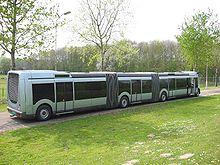Phileas (vehicle)
Phileas is a bus platform from the Dutch manufacturer APTS .
history
The first variant of the Phileas was developed as a track bus system. It has been operating as a pilot project for local public transport in Eindhoven (Netherlands) since 2004 . The project was developed by the Samenwerkingsverband Regio Eindhoven (SRE). It is intended to combine local public transport with high quality without the need for high investment.
The concept emerged in the late 1990s and was also intended to reflect the high level of technical expertise in the Eindhoven region in order to attract new jobs in this area.
The name is based on Phileas Fogg from Journey around the earth in 80 days by Jules Verne and is supposed to symbolize high speed.
Technology and commitment
The Phileas mainly drives on bus lanes . The navigation follows a pre-programmed route, which is constantly checked by a magnetic guidance system in the street. Technically, the buses could drive autonomously, but due to Dutch law there is always a driver on board.
The vehicle is offered in an 18 m long version with one joint and in two-joint versions with 24 or 26 m length. The transport capacities for 4/6/8 standing places per square meter are 103/140/177 passengers at 18 m, 129/171/212 passengers at 24 m and 141/185/230 passengers at 26 m; Deviations are possible depending on the seating arrangement.
Eleven single-joint vehicles with a length of 18 m and one double-joint vehicle (24 m) are used in Eindhoven. The maximum speed is 80 km / h. The interior offers space for 130 or 180 passengers.
Further systems are planned in Vilnius , Korea , Israel and Amsterdam .
The Phileas is also used as a metro bus in Istanbul (Turkey). The Metrobüs system has existed since 2007 and now extends from Avcilar to Kadiköy (2009). However, the 50 Phileas buses used there often fail in practice. It is reported that they are not suitable for routes with many gradients.
In Douai (France), Phileas operates under the name Évéole on line A. The vehicles have doors on both sides at some stations because of the central platforms .
Hydrogen variant
A-joint 18-meter hydrogen - hybrid variant of Phileas operates in two copies since 8 September 2011 at the Rhein-Erft and in Cologne . Two 150 kW buses are used in city traffic in Brühl and Hürth , as well as on the regional bus routes. In addition to APTS, Vossloh-Kiepe (hybrid technology), Hoppecke batteries (battery), RWTH Aachen and FH Cologne (energy management system) were involved in the construction of the bus . Ballard Power Systems bought the fuel cell . The hydrogen required for operation is a waste product from local chemical companies , and recovered braking energy can be stored in a 26 kWh battery. The GVB in Amsterdam since 2012 put two one of these hydrogen buses.
Regionalverkehr Köln GmbH (RVK) has taken the hydrogen hybrid bus from APTS Phileas out of service after a technical problem. The company HET Verkehrstechnik GmbH in Neumarkt am Wallersee bought the bus for further tests and research.
See also
Web links
Individual evidence
- ↑ oA (No longer available online.) Archived from the original on August 6, 2011 ; accessed on October 2, 2018 . Info: The archive link was inserted automatically and has not yet been checked. Please check the original and archive link according to the instructions and then remove this notice.
- ↑ Metrobüs Haliç yokuşunda kaldı! Milliyet.com.tr, accessed October 2, 2018.
- ^ RVK: "Hydrogen hybrid buses now in regular service". (No longer available online.) Archived from the original on March 2, 2018 ; accessed on October 2, 2018 . Info: The archive link was inserted automatically and has not yet been checked. Please check the original and archive link according to the instructions and then remove this notice.
- ↑ Fuel cell bus was delivered to HET GmbH on October 17, 2017, accessed on October 2, 2018.



